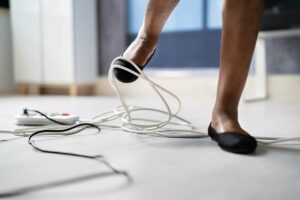Winter weather, with its cold temperatures and families spending increased time indoors, can bring its own set of safety hazards. From shock and fire risks to power outages, safety preparations and precautions are not only for people, but for pets as well. Take steps to ensure your furry family stays safe this winter.
Colder winter temperatures may introduce unfamiliar electrical devices, such as space heaters, heating pads and electric blankets, into the home. Be on the lookout for potential hazards that may accompany such products and keep them away from curious pets.
Discourage pets from sleeping near or behind electronics or appliances. Many are attracted to the warmth, but this is a potential fire hazard. Block off appliances and electronics if you must.
Never let your pet nap on a heating pad or electric blanket, as this presents a risk of electrical burn and can also result in overheating the appliance which may start a fire.
Keep electrical cords tucked away and out of sight of puppies and kittens. If you have difficulty getting your pet to stop chewing on the cord, you can paint it with a bitter tasting deterrent or enclose the cord in a PVC tube or thick plastic sleeve.
Make sure all electronics are completely plugged into wall outlets. Partially exposed prongs are a hazard for curious puppies and kittens.
If you have an aquarium, make sure you create a drip loop on every electrical cord that enters the tank. This will prevent water from running down the cord and into the electrical outlet. To be sure the cord stays looped, stick a cord clip on the wall just below the outlet and thread the cord into the clip.
Winter storms can cause power outages. Be sure to include pets in your emergency weather plans. Keep supplies in your emergency kit for pets in preparation for bad weather. Make sure that it is stocked with at least three days’ worth of food, water and any medicine they may need.
After a storm, remember to use caution if you or your pets must go outside. Be on the lookout for downed lines, damaged electrical equipment, and other conductive materials that they may be in contact with. Stay far away from them and contact your electric cooperative immediately. Just because a line is down does not mean that it no longer carries an electrical charge.
For more electrical safety tips, visit SafeElectricity.org.









